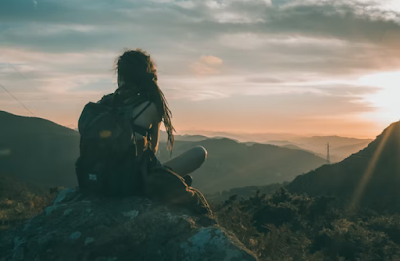Have you ever considered going on a solo journey? Solo travel has several advantages, including the ability to explore new locations at your leisure without waiting for or catching up with travel partners.
You won't be overburdened by the demands and schedules of others. Plus, you'll have more time to appreciate magnificent views, relaxing dinners, and additional time at the sights or activities that interest you the most.
It's natural to be worried or uncomfortable at the notion of solo traveling, especially if you're going to a foreign place where you may know no one.
Fortunately, there are a few practical strategies to keep yourself secure while traveling alone. Here are six ideas to help you feel at ease as a solo traveler;
Keep in touch with trusted family or friends about your travel plans.
The first tip for solo travelers is to send a family member or friend back home your vacation itinerary, hotel reservation information, and details of any scheduled activities.
Also, let the hotel employees know where you're going and when you anticipate returning before going on any solo excursions.
Simply register for the Smart Traveler Enrollment Program (STEP), a free service that lets US residents and nationals who are traveling or living abroad to register their trip with the nearest US Embassy or Consulate.
Enrolling in STEP assures that you will get important details from the embassy regarding the safety conditions in your destination country, allowing you to make educated travel decisions.
The STEP service provides information to the US Embassy regarding your location and how to reach you in the event of an emergency. It also makes it easier for family and friends to contact you if necessary.
Check with your smartphone carrier to identify what skills you'll need at your vacation destination to keep connected with friends, family, or business, even if only sometimes during your solo trips. When you have Wi-Fi connectivity, you can also check in by email or social media.
Make a safety plan in case of emergency
In an ideal world, you'll never have to deal with a medical emergency, an accident, or a robbery while on a solo trip. However, knowing where to go in the event of an awful situation is prudent.
Before you travel, do some research on surrounding emergency services e.g hospital. Learn emergency words in the local dialect if you're traveling out of your country so you can ask for aid if you want it.
Before your departure, check with your doctor to make sure your vaccinations are up to date. Take a supply of any prescription medications you may require, as well as face masks, hand sanitizer, and things to defend yourself from insects and other disease-carrying pests, when packing.
To avoid disease while on a solo trip, it's a good idea to study the quality of drinking water, fresh vegetables, and dining venues in your destination.
Keep Your Valuables Safe
When you go out, simply bring what you need, such as your phone, a credit card, some cash, an ID, and a copy of your passport. Position these in a safe spot that you can behold at all times. Do not place bags containing these items on the ground or out of your sight.
You should also keep a duplicate of your passport in case the original is lost or stolen in an emergency. Keep the copy somewhere safe and different from where you keep your original passport.
Also, think about leaving a duplicate with a friend or family member who lives far away. When catching trains, buses, or other modes of transportation, it's again significant to stay conscious and keep your properties close.
In the hotel safe, keep extra cash, jewelry, your actual passport, and other critical documents.
Use Common Sense and Avoid Risky Behaviors
Several of the following guidelines are applicable anytime you go on a solo trip – even in your town.
Put your drinks in your visual range and don't drink too much. Going somewhere alone with a stranger is not a good idea.
When you're walking, driving, or hiking, be aware of other people around you.
If you're feeling uneasy, go to a public place, such as a restaurant, or join a large number of people.
If anybody asks if you're going alone, explain that you're meeting a spouse, relative, or acquaintance.
Conduct thorough safety research and make informed decisions.
If you are going on a solo trip, learn about the safest neighborhoods in your trip and any spots you should avoid.
Learn the best paths to take and the best kinds of public transportation. Knowing more about the place you'll be going to might assist you in selecting safe hotels.
If at all feasible, get a room on the second or third floor, but not that far from the entrance and hotel amenities. When you've checked in, lock the door with the security chain fixed and don't answer the door unless you expect hotel personnel or visitors.
Purchase travel insurance.
As a solo traveler, protect yourself and the money you've put into your trip from unforeseen circumstances.
Trip cancellation and interruption insurance can help you get reimbursed for covered losses such as those caused by bad weather, natural disasters, certain illnesses, and other factors.
Other types of travel insurance can help cover unexpected medical and evacuation costs, as well as losses caused by baggage delays, theft, and other factors.


Post a Comment